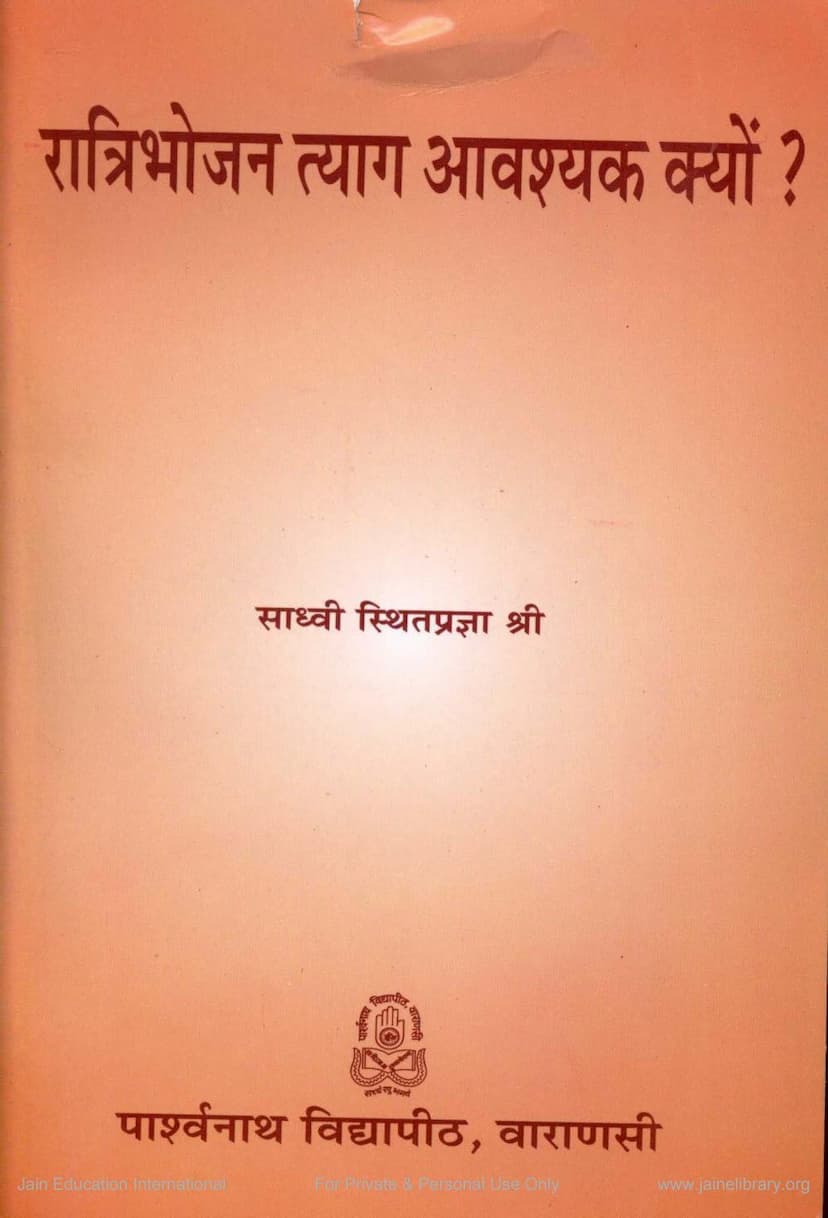Ratribhojan Tyag Avashyak Kyo
Added to library: September 2, 2025

Summary
Here's a comprehensive summary of the Jain text "Ratribhojan Tyag Avashyak Kyo" (Why is Renouncing Night Meals Necessary?) by Sthitpragyashreeji:
This book, published by Parshwanath Shodhpith Varanasi, is a detailed exposition on the Jain practice of abstaining from eating meals after sunset. Authored by Sadhvi Sthitpragyashreeji, who holds a Ph.D. on the dietary practices of Jain monks, the text aims to educate readers on the importance and necessity of this practice from various perspectives.
Core Argument:
The central thesis of the book is that renouncing night meals is not merely a religious ritual but a vital practice that benefits individuals, society, and the environment. It is presented as a fundamental aspect of a healthy, ethical, and spiritually uplifting lifestyle.
Key Themes and Arguments Presented:
- The Importance of Timely Eating: The book emphasizes that while food is essential for life, the time of consumption is as crucial as the food itself. The body's digestive system is most active during daylight hours when natural energy is readily available.
- Scientific and Physiological Reasons:
- Digestive Efficiency: The digestive system, particularly the stomach and pancreas, is most receptive and active from sunrise onwards. As the day progresses, their activity naturally declines, and by sunset, it significantly reduces due to the lack of natural vital energy. Eating at night overwhelms this weakened system.
- "Navel-Lotus" Analogy: The text uses the analogy of a "navel-lotus" that blooms with the sunrise and wilts with sunset. Similarly, the body's internal organs are most active during the day and become less so at night.
- Sunlight's Role: Sunlight contains vital energies (Infra-red and Ultra-violet rays) that aid digestion and have germicidal properties, destroying harmful microorganisms. This benefit is lost at night.
- Sleep Disruption: Eating close to bedtime disrupts sleep, leading to indigestion, restlessness, and poor sleep quality, which in turn affects overall health and mental well-being.
- Religious and Spiritual Significance (Jain Perspective):
- Ahimsa (Non-violence): This is a paramount reason. At night, with reduced visibility, it's easy to cause violence to microscopic organisms present in food and the environment. Lights used for eating or cooking attract and kill insects. The book quotes scriptures like the Dashavaikalika Sutra and Uttaradhyayana Sutra which classify night eating as an "anachar" (improper conduct) or even the "sixth vow" for ascetics, emphasizing its importance akin to the five great vows.
- Purity of Practice: Night meals can lead to the contamination of food by unseen organisms and can also be cooked with impure intentions or in environments prone to violence.
- Spiritual Development: Abstaining from night meals is seen as a form of penance and self-discipline that purifies the mind, reduces attachment to desires (especially food), promotes mindfulness, and facilitates spiritual practices like meditation and prayer. It is considered to yield the benefit of fasting for half a month.
- Scriptural Mandates: The text extensively quotes Jain scriptures (Agamas and commentaries) that strictly prohibit night meals for monks and uphold it as a crucial practice for lay followers as well. It distinguishes between day-made/day-eaten food (ideal) and other combinations, all of which are discouraged if they involve night eating or preparation.
- Health and Medical Benefits:
- Disease Prevention: Modern medical advice suggests eating at least three hours before sleep. Night eating is linked to a host of modern ailments, including digestive problems, obesity, high blood pressure, heart disease, asthma, irritability, and mental disorders.
- Longevity and Vitality: Proper eating habits, including avoiding night meals, contribute to a longer, healthier, and more energetic life.
- Mental Clarity: A clean digestive system leads to a clear mind, essential for learning, concentration, and spiritual pursuit.
- Ethical and Social Implications:
- Countering Westernization: The book laments the influence of Western culture, where night meals have become a status symbol, leading people to neglect their own traditions.
- Family Harmony: Avoiding night meals frees up time for family interaction and religious activities in the evenings, strengthening family bonds. It also provides opportunities for timely charity (alms) to monks and nuns.
- Social Responsibility: By abstaining from night meals, individuals set a positive example for others and contribute to a healthier society.
- Arguments from Other Traditions: The book also cites traditions like Hinduism (Mahabharata, Markandeya Purana, Yajurveda) and Buddhism (as found in the Majjhima Nikaya) that also condemn night meals, highlighting a shared wisdom across different spiritual paths.
- Practical Advice and Encouragement: The book acknowledges the challenges of modern lifestyles, especially in busy urban environments, but encourages individuals to find solutions, such as carrying their own food for evening travel or work. It strongly advises against making exceptions for collective feasts.
- Illustrative Examples (Drishtantas): The text includes several inspiring anecdotes of individuals and families who have diligently followed the practice of renouncing night meals and the positive outcomes they experienced, reinforcing the book's message.
Conclusion:
The book powerfully argues that renouncing night meals is a holistic practice that aligns with scientific understanding, spiritual principles, and health benefits. It urges readers to embrace this time-tested tradition for personal well-being, ethical living, and spiritual progress, emphasizing that it is a path to avoid suffering and attain ultimate liberation.